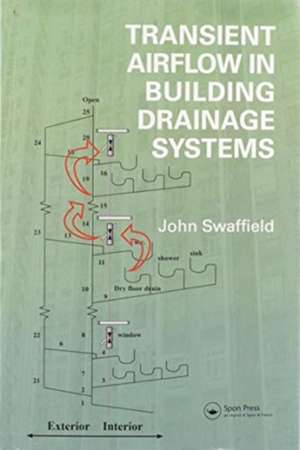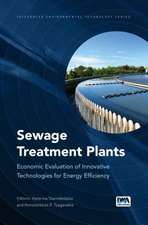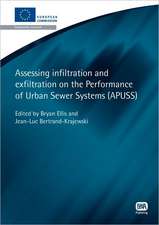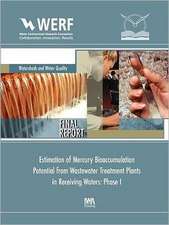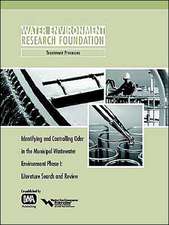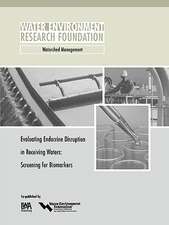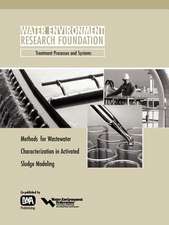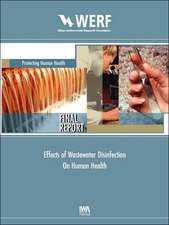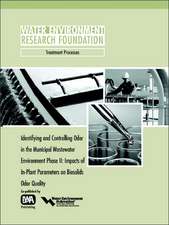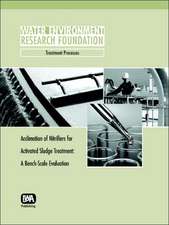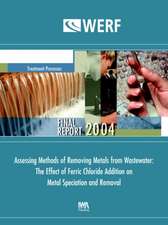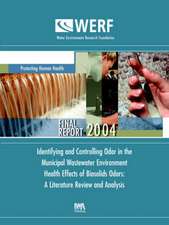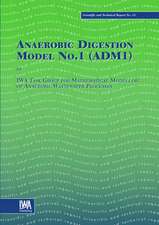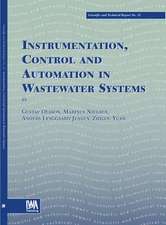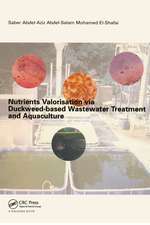Transient Airflow in Building Drainage Systems
Autor John Swaffielden Limba Engleză Paperback – 30 iun 2020
The Method of Characteristics solution techniques which are well established in the pressure surge field are now used to provide solutions for drainage designers. The material is applied to a whole range of abstract scenarios then to a series of real world applications including the forensic modelling of the SARS virus spread within Amoy Gardens in 2003 and the refurbishment of the O2 Dome. Applications to specialised services, including underground station drainage and highly infectious disease treatment facilities are discussed and demonstrated, alongside the use of design and simulation techniques in support of product development.
Aimed at both professional and academic users, this book serves both as a design aid and as a core text for specialist masters courses in public health and building services engineering.
| Toate formatele și edițiile | Preț | Express |
|---|---|---|
| Paperback (1) | 441.36 lei 43-57 zile | |
| CRC Press – 30 iun 2020 | 441.36 lei 43-57 zile | |
| Hardback (1) | 998.43 lei 43-57 zile | |
| CRC Press – 21 apr 2010 | 998.43 lei 43-57 zile |
Preț: 441.36 lei
Nou
Puncte Express: 662
Preț estimativ în valută:
84.45€ • 88.41$ • 69.88£
84.45€ • 88.41$ • 69.88£
Carte tipărită la comandă
Livrare economică 07-21 aprilie
Preluare comenzi: 021 569.72.76
Specificații
ISBN-13: 9780367577186
ISBN-10: 0367577186
Pagini: 362
Dimensiuni: 156 x 234 x 23 mm
Greutate: 0.58 kg
Ediția:1
Editura: CRC Press
Colecția Routledge
ISBN-10: 0367577186
Pagini: 362
Dimensiuni: 156 x 234 x 23 mm
Greutate: 0.58 kg
Ediția:1
Editura: CRC Press
Colecția Routledge
Public țintă
Academic and Professional Practice & DevelopmentCuprins
1. Introduction to Water Flow Induced Air Movement in Building Drainage and Vent Systems 2. Introduction to Unsteady Flow and Pressure Transient Propagation 3. Air Pressure Transient Propagation 4. Theory and Method of Characteristics Solutions 5. Introduction to Air Pressure Transient Control and Suppression Strategies 6. Case Studies 7. Development of Linked Applications of MoC Simulations 8. National Codes 9. Conclusion
Notă biografică
John Swaffield is Emeritus Professor and former head of the School of the Built Environment and its Drainage Research Group at Heriot Watt University, Edinburgh. From 1996 to 2003 he was chair of the Water Regulations Advisory Committee of the UK government’s Department for Environment, Food and Rural Affairs and he was President of the Chartered Institution of Building Services Engineers for 2008–09.
Recenzii
"David Thorpe outlines, in fastidious detail, the journey to a new life that is not only lower impact, but is also delightful and fun- and he is quite prepared to fully address the multiple bureaucratic and technical challenges and along the way. This book is an excellent and immensely practical step by step guide, illustrated with copious examples, for everyone ready to make that change." – George Marshall, founder of the Climate Outreach Information Network and author of Don't Even Think About It: Why Our Brains Are Wired to Ignore Climate Change.
"Over the last 30 years economists have had to reassess how improvements to human welfare are measured. Unfettered growth in household demands causes local and global problems. Measures such as the ecological footprint seek to assess the ‘planet’ consequences of our consumption activities. Practically what it means to live a ‘one-planet’ lifestyle is rarely considered in terms of the benefits and challenges, and this book is therefore a welcome reckoning. A key theme is the fact that maximising consumption activity should not be confused with maximising human welfare." – Professor Max Munday, Director of the Welsh Economy Research Unit, Cardiff Business School.
"David Thorpe's new book is a timely reminder that we have only one planet to live on - and that this fact needs to be reflected how we live, and everything we do. But as well as making the irrefutable case for 'one planet living', it provides a wealth of practical detail on how to actually do it, and this is surely where the book's greatest value lies for a new generation of one planet pioneers determined to lead the way to new ways of living, that tread lightly upon the Earth and sustain her natural riches." – Oliver Tickell, editor, The Ecologist magazine and author of Kyoto2: How to Manage the Global Greenhouse.
"Over the last 30 years economists have had to reassess how improvements to human welfare are measured. Unfettered growth in household demands causes local and global problems. Measures such as the ecological footprint seek to assess the ‘planet’ consequences of our consumption activities. Practically what it means to live a ‘one-planet’ lifestyle is rarely considered in terms of the benefits and challenges, and this book is therefore a welcome reckoning. A key theme is the fact that maximising consumption activity should not be confused with maximising human welfare." – Professor Max Munday, Director of the Welsh Economy Research Unit, Cardiff Business School.
"David Thorpe's new book is a timely reminder that we have only one planet to live on - and that this fact needs to be reflected how we live, and everything we do. But as well as making the irrefutable case for 'one planet living', it provides a wealth of practical detail on how to actually do it, and this is surely where the book's greatest value lies for a new generation of one planet pioneers determined to lead the way to new ways of living, that tread lightly upon the Earth and sustain her natural riches." – Oliver Tickell, editor, The Ecologist magazine and author of Kyoto2: How to Manage the Global Greenhouse.
Descriere
Providing the first comprehensive presentation of the groundbreaking research undertaken at Heriot Watt University with industrial funding, this book brings a new perspective to the design of building drainage and vent systems. It provides the building services community with clear and verifiable design methods that will be robust enough to meet
